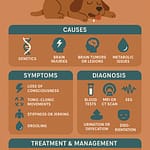Canine distemper is a serious and often fatal viral disease that affects dogs. It’s caused by a virus that attacks the respiratory, gastrointestinal, and nervous systems.

How is it Spread?
Canine distemper is highly contagious and spreads through direct contact with infected dogs or indirect contact with contaminated surfaces. The virus can also be airborne, making it easy to spread in shelters or crowded dog parks.
Symptoms of Canine Distemper
Symptoms can vary widely, but they often include:
- Respiratory Signs: Coughing, sneezing, runny nose
- Gastrointestinal Signs: Vomiting, diarrhea
- Neurological Signs: Seizures, tremors, circling, head tilt, muscle spasms, paralysis
It’s important to note that not all dogs will exhibit all of these symptoms, and the severity of the disease can vary greatly.
Treatment and Prevention
Unfortunately, there is no specific cure for canine distemper. Treatment focuses on managing symptoms and supporting the dog’s immune system. This may involve:
- Supportive Care: Providing fluids, nutritional support, and pain management
- Antibiotics: To prevent secondary bacterial infections
- Anti-seizure Medication: To control neurological symptoms
However, even with aggressive treatment, many dogs do not survive.
The best way to protect your dog from canine distemper is through vaccination. Regular vaccinations are crucial, especially for puppies. It’s also important to keep your dog away from other dogs, especially those that are sick or unvaccinated.
If you suspect that your dog may have canine distemper, it’s important to consult with a veterinarian as soon as possible. Early diagnosis and treatment can improve the chances of recovery.
Just in case you have liberty to try something when every ethical treatment fails. watch the video below
here is one in this video

Dr. Suranjan Sarkar is a veterinarian and also a writer and editor for both print and digital with a love for travel, animal, and architecture. Much of his writing has focused on human and animal health and welfare. A life-long pet owner, His two favorite canine quotes are, “Be the kind of person your dog thinks you are,” and “Dogs communicate their feelings honestly and directly. There’s no hidden agenda or manipulation.”










